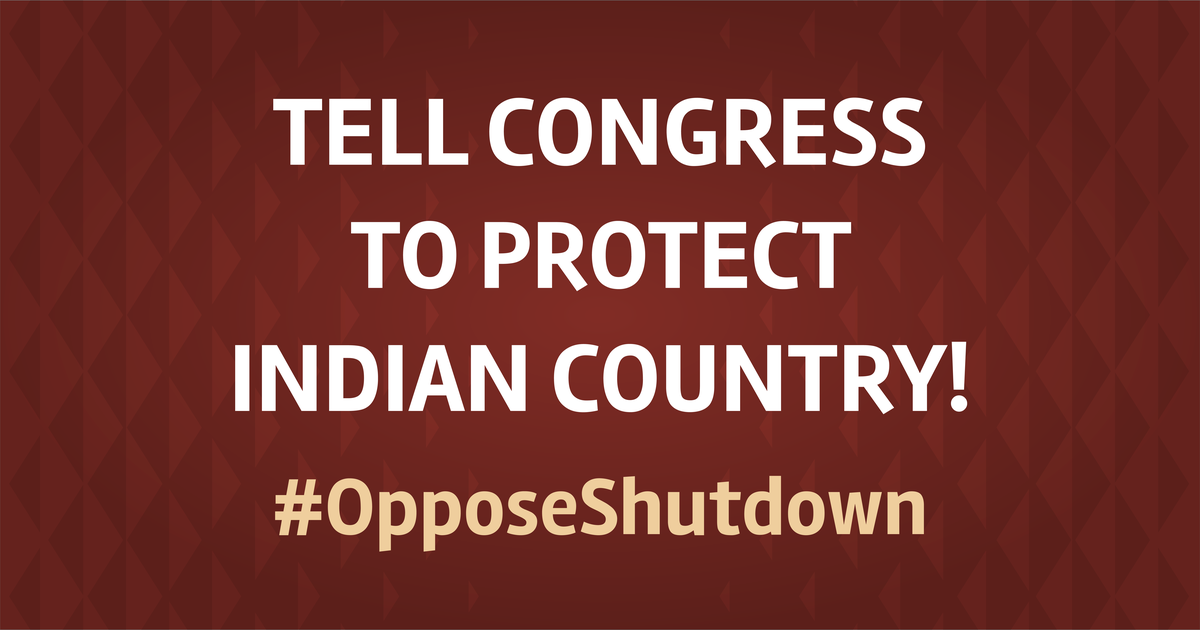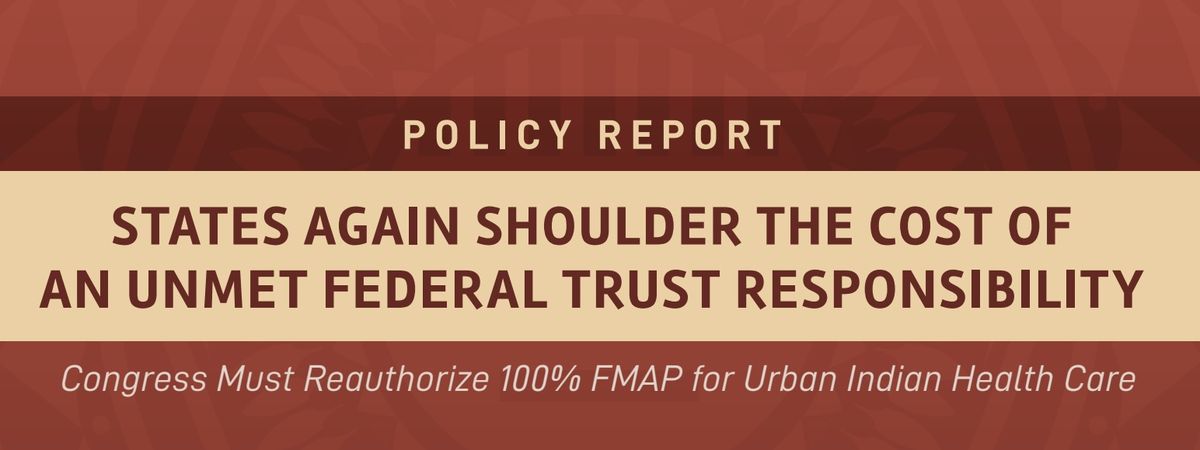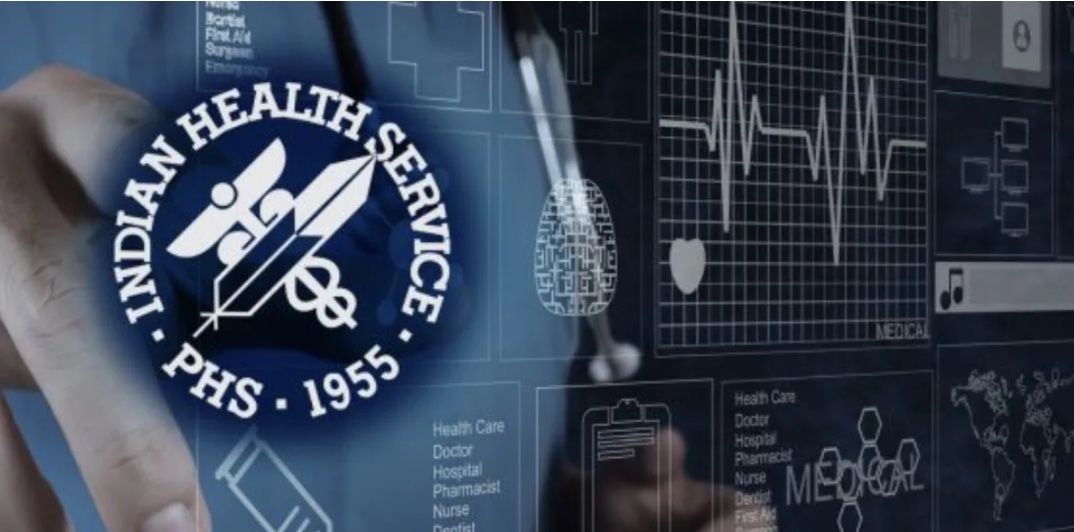September Policy Updates: Government Shutdown, SDPI Call to Action & More Important News
September is almost over and Congress is running out of time to pass its budget!
Here’s what’s happening next week:
NCUIH UIO Focus Groups
- October 3: Full Ambulatory at 1:00-2:30 pm EDT [Register Here]
- October 3: Outpatient and Residential at 3:00-4:30 p.m. EDT [Register Here]
- October 4: Limited Ambulatory at 1:00-2:30 p.m. EDT [Register Here]
- October 4: Outreach and Referral at 3:00-4:30 p.m. EDT [Register Here]
- October 5: Makeup Session at 1:00-2:00 p.m. EDT [Register Here]
US Government Shutdown: What You Need to Know
The big picture: Government funding is set to expire on September 30. If Congress can not reach a funding agreement before that date, there will be a government shutdown.
Go deeper: Congress has thus far failed to reach an agreement on government funding. The House and Senate are both strategizing on ways to prevent a shutdown but no clear consensus or path forward exists as of Thursday afternoon.
Why it matters: If the Government were to shutdown, it would have profound impacts such as:
- Tribal law enforcement and courts, Tribal housing programs, and primary, secondary, and higher education will switch to emergency operating plans.
- No funding for Contract Support Costs, payment for Tribal leases, and Health Care Facilities construction.
- The Department of Health and Human Services wouldn’t be able to award Head Start Grants during a shutdown.
The bottom line: Due to NCUIH and other Native organization’s success of including advance appropriations for the Indian Health Service, if there is a shutdown, funding will be maintained for almost all programs in the Services and Facilities accounts, including funding for urban Indian organizations.
Take Action: Join NCUIH in our urgent opposition to budget cuts for Indian Country and the federal shutdown. We have prepared a social media toolkit with a set of resources and guidelines that you can use to communicate the urgency of this issue.
The big picture: On September 15, NCUIH released a policy report on the importance of setting the federal medical assistance percentage (FMAP) at 100% for services provided to Medicaid beneficiaries at urban Indian organizations (100% FMAP for UIOs).
By the numbers: With Medicaid beneficiaries making up 46% of the UIO Native patient population, 100% FMAP for UIOs is critical to expanding community health programming and youth services, ultimately leading to improved long-term health outcomes.
Go deeper: The report reflects the findings from case studies of two states, Washington and Montana, that successfully utilized the American Rescue Plan Act’s (ARPA) temporary authorization of 100% FMAP for UIOs to increase funding support for their UIOs.
Why it matters: The reports’ findings demonstrate that 100% FMAP for UIOs results in:
- Increased services for Native patients ⬆️
- Significant cost savings for states 💲
- Flexibility for states to support UIOs in their health care delivery 🏥
What they’re saying: “This report showcases what we already knew: when the federal government faithfully honors its Trust responsibility to Native people, health access in our communities improves,” said Francys Crevier, CEO of NCUIH. “This provision has broad support across Indian Country because it directly impacts our people. Congress must act now to permanently reauthorize 100% FMAP for UIOs.”
We need your help contacting Congress to support the reauthorization of the Special Diabetes Program for Indians (SDPI)! With the program ending in 2 days, it remains critical that Congress reauthorizes SDPI to ensure there is no lapse in funding.
NCUIH is monitoring several bills that contain a reauthorization for SDPI:
- The Special Diabetes Program Reauthorization Act of 2023 (H.R. 3561/S. 1855), which would reauthorize the SDPI program at $170 million per year for two years, has passed out of committee in both the House on May 24 and Senate on June 15. It currently awaits consideration by the full House and Senate.
- The Lower Costs, More Transparency Act (H.R. 5378), which is a large health care package that includes reauthorization of SDPI, was pulled unexpectedly pulled from House consideration for floor vote last week.
Take Action: Use NCUIH’s toolkit to contact your Member of Congress to to support the reauthorization of SDPI today!
Upcoming: NCUIH UIO Focus Groups
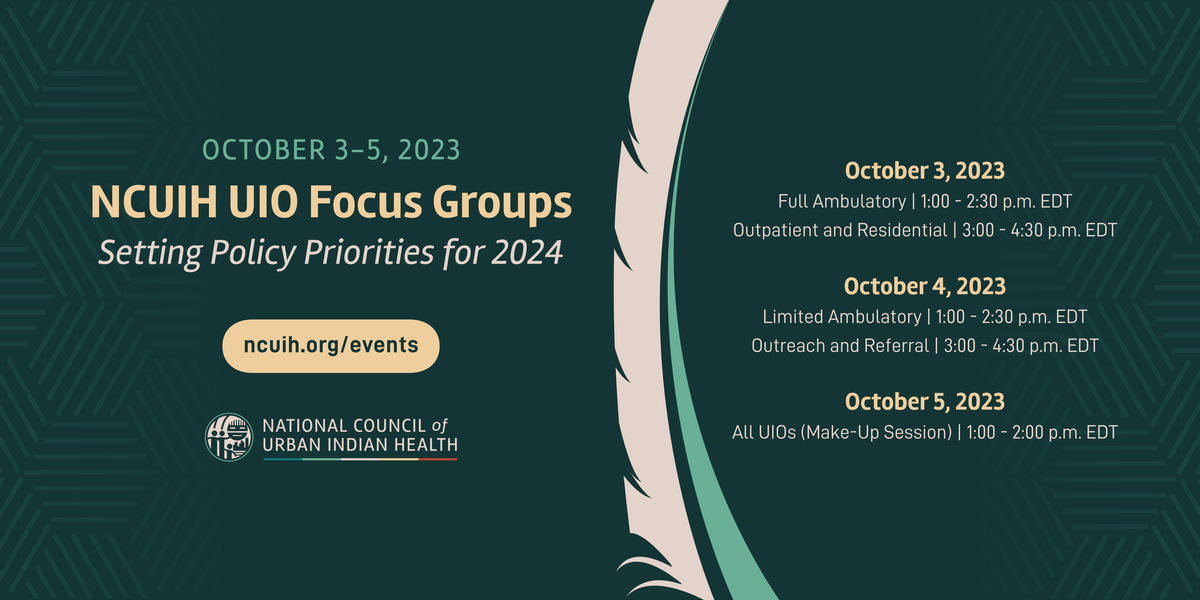
We are excited to announce our upcoming virtual web series, “NCUIH UIO Focus Groups: Setting Policy Priorities for 2024.” These focus groups are open to UIO leaders and their staff.
Why it matters: The focus groups will also provide an invaluable opportunity to reflect on the achievements and challenges of 2023, fostering a deeper understanding of the progress made and the areas that require further attention.
The big picture: Participants will be encouraged to share their personal experiences, insights, and feedback, ensuring that the perspectives of our UIO partners play a pivotal role in shaping the path forward.
What if I can’t make it?: If you cannot attend your facility-type session or the makeup session, NCUIH will schedule a one-on-one session with you. Please email policy@ncuih.org to request a one-on-one session.
Legislative & Federal Updates: NCUIH Requests VA inclusion of UIOs, Native American Child Protection Act Passed in the House
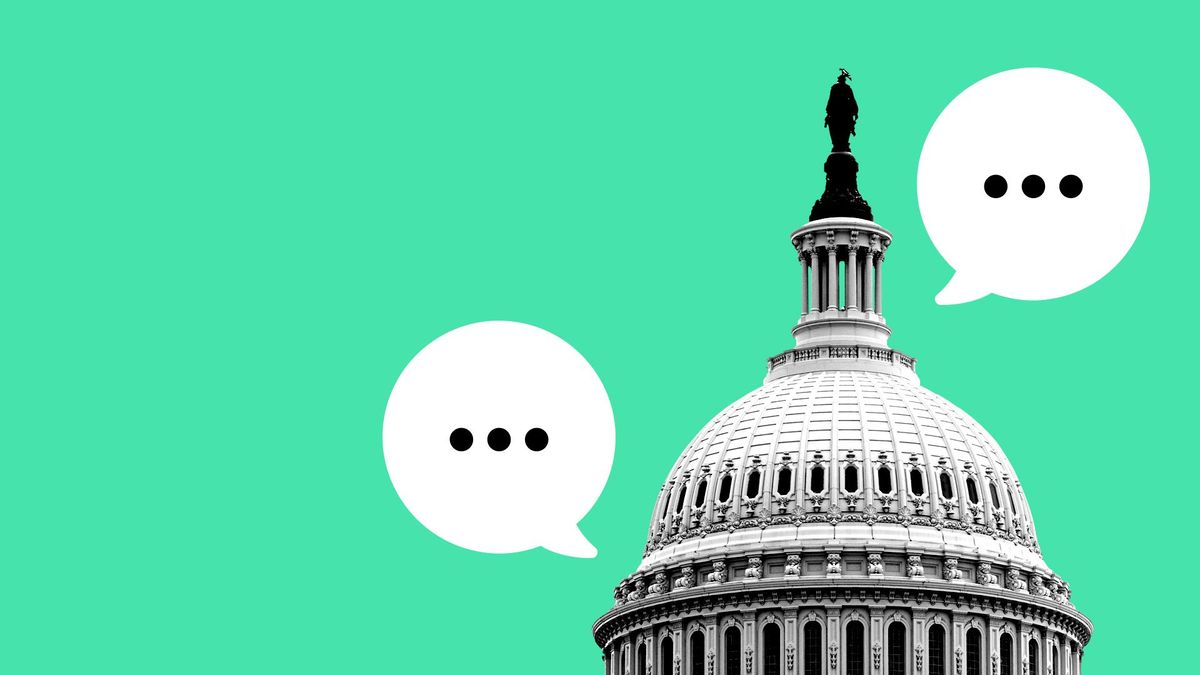
On September 15, NCUIH submitted comments to the Department of Justice (DOJ), Department of Interior (DOI), and Department of Health and Human Services (HHS) regarding the Indian Child Welfare Act (ICWA) and steps the agencies can take to promote federal protections for American Indian and Alaska Native (AI/AN) children and their parents and caregivers.
- The bottom line: NCUIH recommended that the Agencies actively inform state courts and child welfare agencies about the need to utilize UIOs to meet their obligations under ICWA, assist Tribes in coordinating with UIOs to strengthen resources and efforts to ensure ICWA is properly implemented, and engage directly with UIOs to improve implementation of ICWA.
- Why it matters: AI/AN children continue to be overrepresented in the state foster care systems, and because more than 70% of AI/AN people live in urban settings, this overrepresentation undoubtedly includes AI/AN children living in urban areas. ICWA is the gold standard of child welfare proceedings, and ICWA’s procedural protections ensure that an AI/AN child’s best interests are appropriately accounted for in child welfare proceedings. The federal government must consider the needs of AI/AN children and families living in urban areas in efforts to promote federal protections for AI/AN children and their parents and caregivers.
On August 21, NCUIH submitted comments to the Department of Veterans Affairs (VA) Center for Minority Veterans (CMV) in response to a request for data and information on minority veterans.
- The bottom line: NCUIH provided an analysis showing that VA’s data historically excludes large portions of the AI/AN veteran population. NCUIH recommended that the Agency ensure data on AI/AN Veterans accounts for those living in urban areas and for those identifying as AI/AN alone or in combination with other races, clarify that data collections concerning AI/AN veterans do not undermine the unique political status of AI/ANs, and engage directly with Tribes, UIOs, and the VA Advisory Committee on Tribal and Indian Affairs to improve outreach, education, engagement, enrollment, advocacy and access programs for AI/AN veterans.
- Why it matters: Data and information on minority and historically underserved veterans can inform efforts to improve outreach, education, engagement, enrollment, advocacy, and access programs for minority and underserved veterans.
On September 18, 2023, NCUIH-endorsed legislation, the Native American Child Protection Act (H.R. 633) passed the House with a vote of 378-32.
- Why it matters: This bill reauthorizes through FY2028 and otherwise revises certain programs related to the prevention, investigation, treatment, and prosecution of family violence, abuse, and neglect involving Indian children and families. The bill directs the Indian Child Resource and Family Services Centers to develop and provide advice, technical assistance, and training to UIOs. It also allows UIO representatives with expertise in child abuse and child neglect to sit on a 12-member Advisory Board.
Upcoming Events and Important Dates: IHS FY 2026 Tribal Budget Meeting, UIO Listening Session on Behavioral Health and Substance Use Disorder Resources
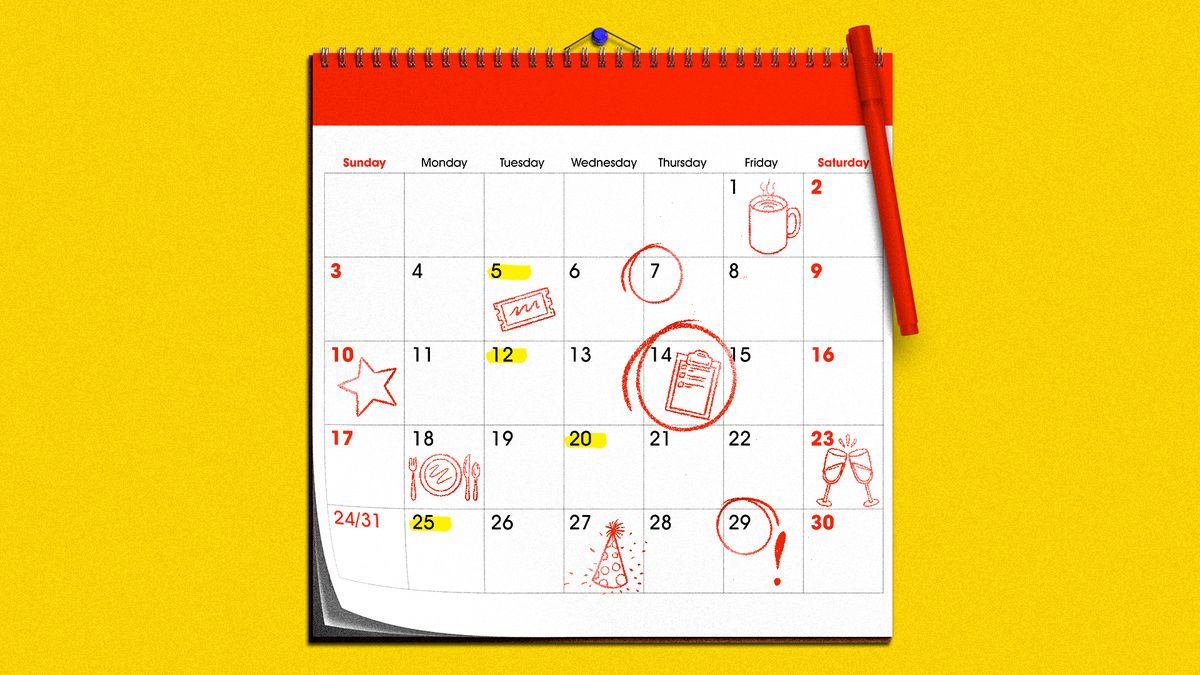
Upcoming Opportunities:
- The VA Office of Tribal Government Relations (OTGR) is seeking nominations of qualified candidates to be considered for appointment as a member of the Advisory Committee on Tribal and Indian Affairs (“the Committee”) to represent the following Indian Health Service (IHS) Areas: California; Nashville. Nominations for membership on the Committee must be received no later than 5:00 PM Eastern on October 20, 2023, and should be mailed to OTGR at 810 Vermont Ave. NW, Suite 915H (075) or emailed to tribalgovernmentconsultation@va.gov. UIOs are encouraged to work with local Tribes and Tribal organizations to identify local American Indian and Alaska Native veterans for nomination.
Upcoming Comments and Submissions:
- October 13: Comment deadline to the USDA Food and Nutrition Service – Improving Access and Parity
Upcoming Events:
- October 3-5: NCUIH UIO Focus Groups
- October 12: IHS FY 2026 National Tribal Budget Formulation Process and Area Instructions Meeting
- October 13: End of Early Bird Registration for the National Congress of American Indians (NCAI) Conference
- October 17: Medicare, Medicaid and Health Reform Policy Committee (MMPC) Face-to-Face Meeting
- October 18-19: Centers for Medicare & Medicaid Services (CMS) Tribal Technical Advisory Group (TTAG) Face-to-Face Meeting
- October 19: Urban Program Executive Directors/Chief Executive Officers Monthly Conference Call
- October 19: Substance Abuse and Mental Health Services Administration(SAMHSA)/UIO Listening Session on Behavioral Health and Substance Use Disorder Resources for Native Americans Program (Section 1201 Program) [Join Here]
Important Requests for Information from UIO Leaders
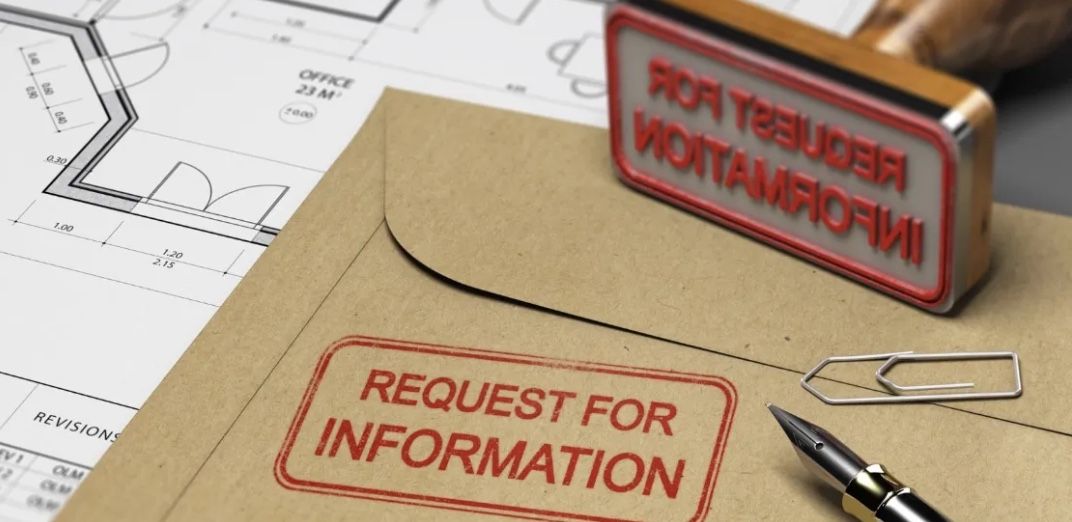
We need input from Urban Indian leaders to help shape our advocacy and comments to federal agencies on policies affecting UIOs and American Indians/Alaska Natives living in urban areas.
Please email policy@ncuih.org with information on the following:
- Food Security: Does or has your UIO worked with Tribes to address food insecurity in AI/AN communities? Would you be interested in doing so in the future?
- Advance Appropriations: Does your UIO have any questions for IHS regarding advance appropriations implementation?
NCUIH in Action: NCUIH Speaks at American Cancer Society’s Cancer Action Network “Expanding Cancer Health Equity” Summit on Capitol Hill
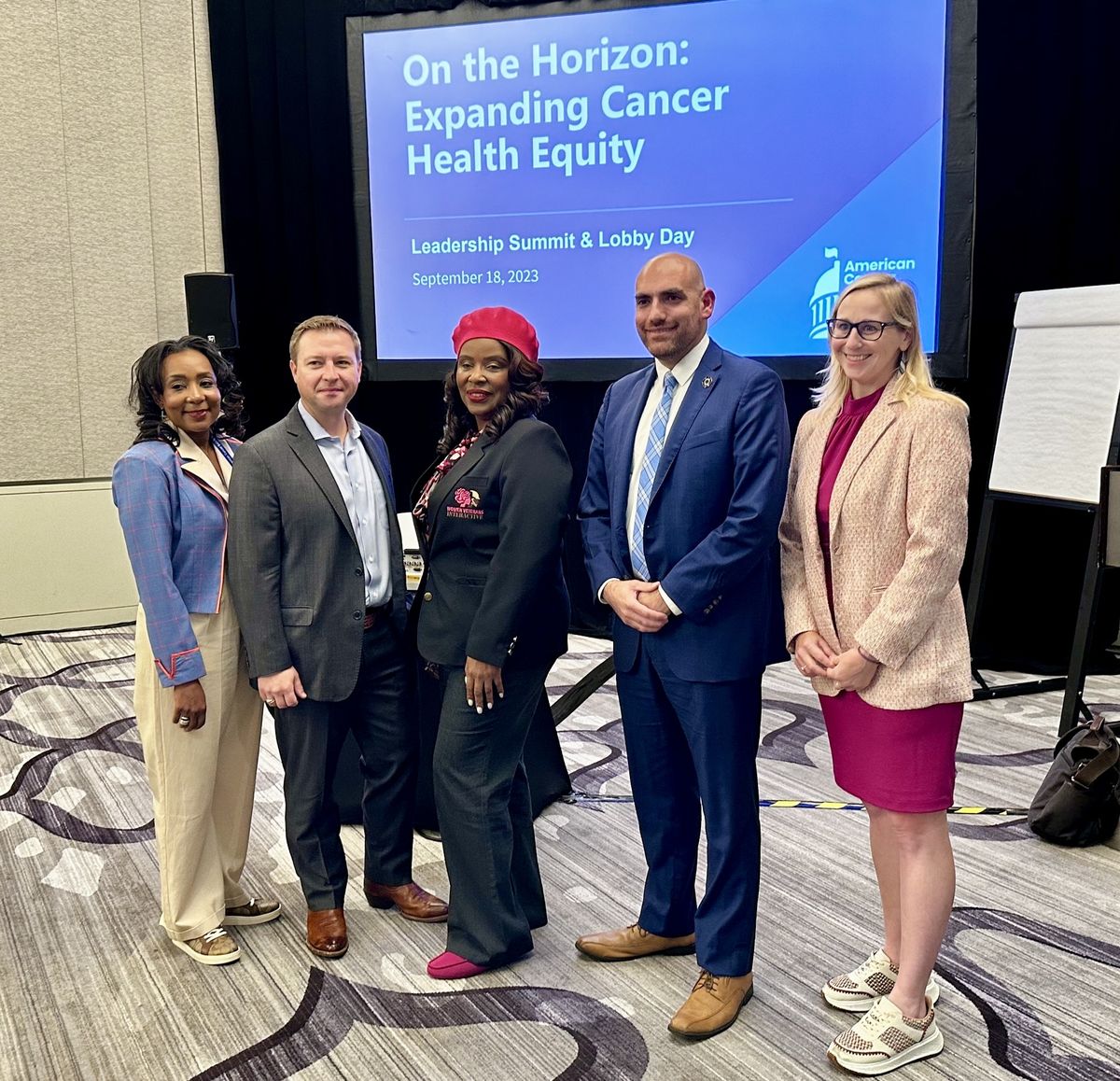
(L to R) Angela Sailor, Director, Federal Strategic Alliances – Health Equity American Cancer Society Cancer Action Network, Michael Reese Wittke, Vice President, Policy & Advocacy National Alliance for Caregiving, Ginger Miller, Founder and CEO, Women Veterans Interactive Foundation, Evan Davis, Director of Government Affairs, International Association of Fire Fighter, Meredith Raimondi, Vice-President of Policy and Communications, National Council of Urban Indian Health.
On September 18, 2023, Meredith Raimondi, VP of Policy and Communications at NCUIH, delivered a powerful presentation at the American Cancer Society Cancer Action Network (ACS CAN) Annual Leadership Summit and Hill Day event, emphasizing the critical need for full and mandatory funding in the Indian health system. Raimondi highlighted the devastating health disparities Native people face, particularly in cancer incidence and mortality. Moreover, Raimondi stressed the importance of advance appropriations for IHS to ensure stability for Native cancer patients, citing the impact of government shutdowns on urban Indian clinics and the need for policy change. It was an honor for Meredith to stand alongside fellow policy professionals and advocate for vital health care improvements.
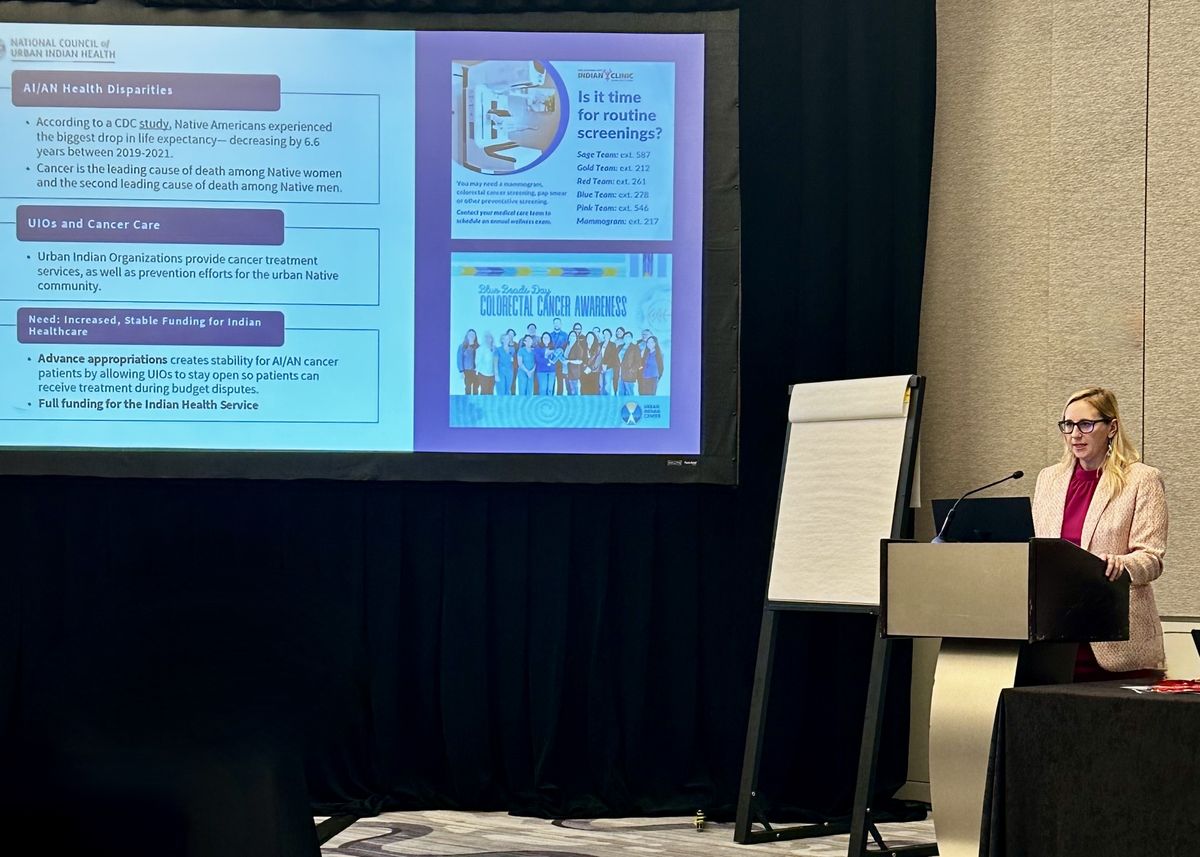
Meredith Raimondi, NCUIH Vice-President of Policy and Communications, presents at the American Cancer Society Cancer Action Network (ACS CAN) Annual Leadership Summit and Hill Day.
Thank you for all your hard work and advocacy!


